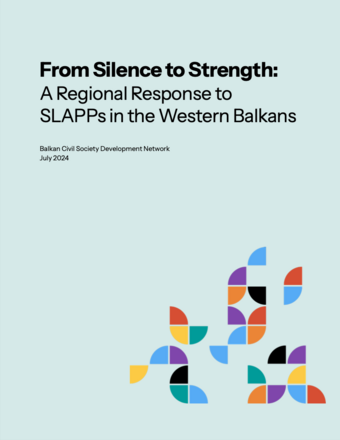
The Western Balkans region has seen numerous cases of Strategic Lawsuits Against Public Participation (SLAPPs) targeting individuals acting on behalf of both private and public institutions. These lawsuits are often aimed at activists and ordinary citizens involved in community issues. The BCSDN report is a pioneering study as it includes data on all six Western Balkan countries: Albania, Bosnia and Herzegovina, Kosovo, Montenegro, North Macedonia, and Serbia. The study employed a multi-method approach, including desk research, literature review, legal framework analysis, and interviews with the targets of SLAPPs. Despite the thorough approach, the research faced limitations such as a lack of public data on SLAPPs and the challenge of categorizing these lawsuits due to their multifaceted nature.
Key Findings
- Legislative Gaps:
- Freedom of expression is guaranteed by the constitutions of all six countries, but there is no direct legislation targeting SLAPPs in the region.
- In Bosnia and Herzegovina, there is an attempt to address the issue through a draft anti-SLAPP law, which aims to protect citizens and activists.
- Defamation Laws:
- In Albania and Republika Srpska, defamation is treated as a criminal offense.
- Regional Trends and Patterns:
- The absence of anti-SLAPP legislation across the region poses a significant challenge.
- Targets of SLAPPs include environmental activists, watchdogs, journalists, and media.
- Common topics triggering SLAPPs involve environmental issues, public funding expenditure, and other sensitive topics.
- Plaintiffs are typically large companies, powerful businessmen, politicians, and public institutions.
- Country-Specific Impacts:
- In Albania, Kosovo, and North Macedonia, journalists and media are most frequently affected.
- In Bosnia and Herzegovina and Serbia, the main targets are activists and human rights defenders.
Strategies Employed in SLAPPs
Plaintiffs in SLAPP cases commonly use several strategies to intimidate and silence their targets:
- Demanding disproportionately high compensation.
- Procedural delays to exhaust the resources of the defendants.
- Temporarily suspending court proceedings.
- Forum shopping to find a favorable jurisdiction.
- Misusing the legal framework outside litigation procedures, such as manipulating GDPR regulations.
- Conducting targeted disinformation and negative public campaigns against the defendants.
Recommendations
- Establish a precise definition of SLAPPs and set criteria for their early identification and dismissal.
- Develop effective strategies and legal frameworks to counter SLAPPs and protect civic space.
- Implement legal reforms to ensure the clear recognition and prompt dismissal of SLAPPs.
- Create streamlined legal procedures and ensure consistent judicial decisions.
- Provide specialized training for judges and legal professionals.
- Organize educational and capacity-building programs for relevant stakeholders.
- Engage in rigorous monitoring, advocate for necessary reforms, and increase public awareness.
- Foster regional and international cooperation and build alliances.
- Offer support mechanisms such as legal aid, financial assistance, and psychological support for SLAPP victims.
The content of this article can be used according to the terms of Creative Commons: Attribution-NonCommercial 4.0 International (CC BY-NC 4.0) . To do so use the the wording "this article was originally published on the Resource Centre on Media Freedom in Europe" including a direct active link to the original article page.

